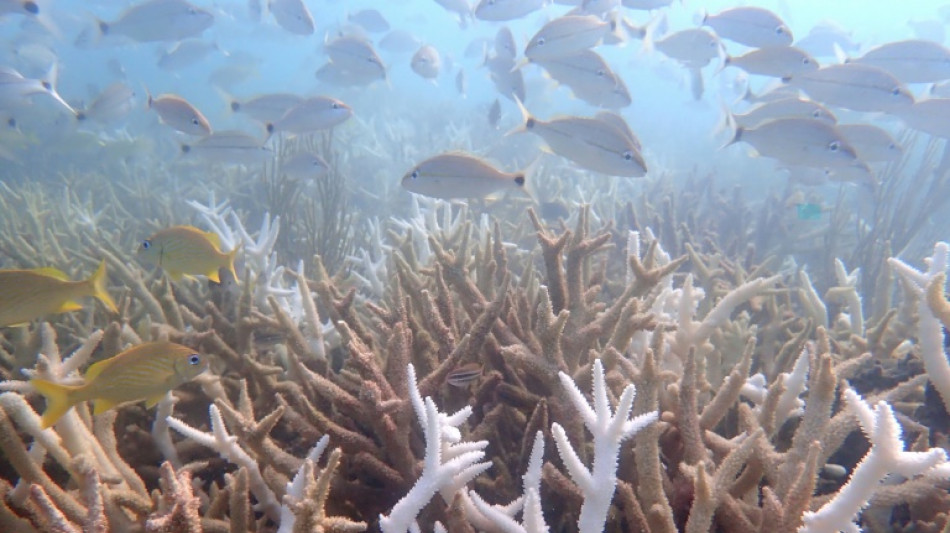
-
 Inside the bunker where Zelensky led response to Russian invasion
Inside the bunker where Zelensky led response to Russian invasion
-
France demands explanation from US envoy over 'surprise' no-show

-
 Putin failed to achieve goals in Ukraine, Zelensky says on war anniversary
Putin failed to achieve goals in Ukraine, Zelensky says on war anniversary
-
China tightens Japanese trade restrictions as spat worsens

-
 Ukraine war exhibition opens at Berlin Nazi bunker museum
Ukraine war exhibition opens at Berlin Nazi bunker museum
-
Jihadist threat puts eastern Senegal on edge

-
 Kim Yo Jong: the powerful sister behind North Korea's supreme leader
Kim Yo Jong: the powerful sister behind North Korea's supreme leader
-
North Korea ruling party promotes Kim Jong Un's younger sister

-
 Mexico's Jalisco cautiously tries returning to normal after cartel violence
Mexico's Jalisco cautiously tries returning to normal after cartel violence
-
Mexico's violence-hit Guadalajara to host World Cup games

-
 Mourinho's Bernabeu homecoming upended by suspension, racism row
Mourinho's Bernabeu homecoming upended by suspension, racism row
-
China targets Japanese companies over military ties

-
 Griezmann in talks to join MLS side Orlando City: source
Griezmann in talks to join MLS side Orlando City: source
-
France to revoke US envoy's govt access after summons no-show

-
 Spurs overpower Pistons in clash of NBA's form teams
Spurs overpower Pistons in clash of NBA's form teams
-
Inoue to fight Nakatani in Tokyo in May: reports

-
 Canada PM to push trade, rebuild fractured ties in India trip
Canada PM to push trade, rebuild fractured ties in India trip
-
Asian markets mixed as traders weigh AI and tariffs outlook

-
 Votes may 'melt like snow': Reform, Greens eye Labour UK bastion
Votes may 'melt like snow': Reform, Greens eye Labour UK bastion
-
Venezuela says exiles welcome to return following mass amnesty

-
 Australia buys parts for future AUKUS sub reactor
Australia buys parts for future AUKUS sub reactor
-
Ukraine marks four years since Russian invasion

-
 Brazil court to try politicians over hit on black councilwoman
Brazil court to try politicians over hit on black councilwoman
-
Interim president says Venezuelans welcome to return after amnesty law

-
 Man kills police officer in Moscow train station blast
Man kills police officer in Moscow train station blast
-
Despite drop in 2025, Russian oil exports exceed pre-war volumes: report

-
 Bytek Joins the Google Cloud Ready - BigQuery Program
Bytek Joins the Google Cloud Ready - BigQuery Program
-
Formation Metals Intersects 0.95 g/t Au over 61.1 Metres, including 1.68 g/t Au over 26.5 Metres at the Advanced N2 Gold Project; Bulk-Tonnage Gold Target Identified with 8 Kilometres of Strike to Explore

-
 Bolt Metals Announces Closing of Fully Subscribed Private Placement
Bolt Metals Announces Closing of Fully Subscribed Private Placement
-
InterContinental Hotels Group PLC Announces Transaction in Own Shares - February 24

-
 Nikon Expands Popular Monarch and Prostaff Binocular Lines
Nikon Expands Popular Monarch and Prostaff Binocular Lines
-
Australian PM seeks removal of UK's Andrew from line of succession

-
 Carrick hails 'ruthless' Man Utd match-winner Sesko
Carrick hails 'ruthless' Man Utd match-winner Sesko
-
N.Korea leader's sister promoted at party congress

-
 The key to taking down Mexico's most-wanted narco? His girlfriend
The key to taking down Mexico's most-wanted narco? His girlfriend
-
Winter storm blankets US northeast as travel bans imposed

-
 Super-sub Sesko fires Man Utd to win at Everton
Super-sub Sesko fires Man Utd to win at Everton
-
YouTube exec says goal was viewer value not addiction

-
 Panama wrests control of canal ports from Hong Kong group
Panama wrests control of canal ports from Hong Kong group
-
Trump denies top US officer warned of Iran strike risks

-
 Mayweather to fight Pacquiao in Las Vegas in September
Mayweather to fight Pacquiao in Las Vegas in September
-
US stocks tumble on tariff fog, worries over AI

-
 US says China 'massively expanded' nuclear arsenal
US says China 'massively expanded' nuclear arsenal
-
US forces to complete withdrawal from Syria within a month

-
 US winter storm brings rare hush to snowy New York
US winter storm brings rare hush to snowy New York
-
George adamant Six Nations losses don't make England 'a bad team overnight'

-
 US Supreme Court to hear bid to block climate change suits
US Supreme Court to hear bid to block climate change suits
-
Canada summons OpenAI over failure to report mass shooter

-
 From Odesa to Bakhmut, revisiting a Ukrainian family torn by war
From Odesa to Bakhmut, revisiting a Ukrainian family torn by war
-
Vonn says Olympic injury could have led to amputation


'Functionally extinct': Heat wave left Florida coral species on brink
A record-breaking marine heat wave in 2023 left two ecologically vital coral species "functionally extinct" in Florida's Coral Reef, a study said Thursday, highlighting the growing dangers a warming climate poses for the world's oceans.
Elkhorn and staghorn corals, which take their names from the antler shapes they resemble and belong to the Acropora family, are fast-growing "reef builder" species that long dominated waters off Florida and in the Caribbean.
Both species -- but particularly elkhorn -- created complex branch-like structures akin to the dense canopy of a forest, providing crucial habitats for fish and acting as natural barriers against strong waves and coastal erosion.
The pair have been declining since the 1970s from threats including climate change, disease and unsustainable fishing, which combined to leave them critically endangered.
But the 2023 heat wave -- which persisted for almost three months and brought record-high ocean temperatures off Florida -- proved a death knell for the two species in the Florida Coral Reef, the world's third-largest barrier reef.
"The numbers of these species that are left on the reef today are now so low that they're no longer able to perform their functional role in the ecosystem," Ross Cunning, a research biologist at the Shedd Aquarium in Chicago and co–first author of the paper that was published in Science, told AFP.
"This is something that demonstrates the level of climate pressures on our natural world and something we all need to take extremely seriously," he added.
Research to determine how many remain in the Caribbean is underway, but the picture appears bleak there, too.
- Restoration efforts -
Coral are made up of tiny individual animals called polyps, which maintain a symbiotic relationship with microscopic algae that live within their tissues. When the algae are stressed by heat or pollution, however, they leave, causing the coral to "bleach" and become vulnerable to disease and death.
Recovery is sometimes possible.
But the new research, which involved diver surveys to track more than 52,000 colonies of staghorn and elkhorn coral across 391 sites, unfortunately confirmed scientists' worst fears: the two species were nearly totally wiped out, with mortality ranging 98-100 percent in the Florida Keys and Dry Tortugas off the state's south coast.
They fared better off southeast Florida, on the northern extent of the reef tract, where mortality rates were around 38 percent thanks to slightly cooler conditions.
In a blow to conservation efforts the losses impacted both wild and restored Acropora, grown in nurseries then planted onto the reef as part of restoration projects that have been in place since the 2000s.
It's not yet well understood what made the elkhorn and staghorn coral more sensitive to heat than other coral species that did not experience the same catastrophic losses.
Scientists have been safeguarding many of Florida's remaining Acropora in aquariums and nurseries, and have since added survivors of the 2023 heat wave. The idea is to study the genes that helped them withstand heat, and possibly introduce new genetic diversity from populations outside of Florida that might boost resilience.
"Restoration is more critical than ever to preventing a complete extinction," said Cunning. "But we know that the way that we perform restoration fundamentally needs to change -- we can't continue just planting out as much coral as possible."
Ultimately, efforts to help coral adapt must go hand-in-hand with action to curb climate change and save the reefs -- which support a quarter of all ocean life, provide food and income for hundreds of millions of people, protect shorelines from waves and floods and are even responsible for beloved sandy white beaches.
"Coral reefs may be some of the first ecosystems on our planet to be feeling impacts at this level from extreme heat waves due to climate change," said Cunning. "But what does that mean for the next ecosystem?"
O.Johnson--AMWN

